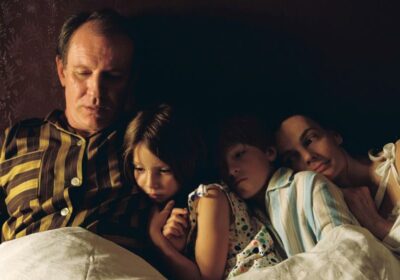‘Word’ Review: A Stately, Stirring Czech Portrait of Family Life in a Hostile Political Climate

For anyone passingly familiar with the turbulent events of 1968 in modern Czech history — or even the various films about them, from Philip Kaufman’s “The Unbearable Lightness of Being” to more home-grown evocations of the Prague Spring and ensuing Soviet invasion — director Beata Parkanová’s decision to set her second feature “Word” in that very year feels like a dramatic short cut, coloring proceedings from the outset with danger and anxiety that require little establishment or explanation. There’s enough finely sketched interior drama, however, in this study of a middle-class family facing down Communist Party threats, that its somewhat generalized sense of milieu feels like a strategic contrast: a crisp little picture framed in a hazy bigger one, defined by a nervy national mood that is implicitly felt rather than explicitly illustrated.
That elision of historical particularity in favor of a sensually recalled zeitgeist might make “Word” — the standout Czech feature of this year’s Karlovy Vary competition — an easier sell with local audiences who can most immediately fill in its political blanks. But that could just as easily work in its favor with international arthouse viewers, who will find few cultural barriers to a simple, resonant story of an oddly matched married couple nonetheless bound by shared personal and political principles, protecting their family from judgment and harassment by an increasingly conformist community.
That lends Parkanová’s film — a more ambitious and formally rigorous work than her 2018 debut “Moments,” which likewise launched at Karlovy Vary — a sense of quiet urgency and peril, even as the violent imagery we associate with its historical backdrop is largely kept off-screen. There’s probably no budget here for tanks in the streets, but “Word” never feels like it’s missing them. Instead, the narrative predominantly unfolds in charged, brittly hushed rooms, as viewed through an often serenely still camera lens. When we venture out, it’s into little-populated village streets, sled slopes and beaches — the whole country, it feels, collectively holding its breath.
We begin in the neat, roomy but somewhat stuffy office of Václav (Martin Finger), a middle-aged, mild-mannered notary public who spends his days calmly mediating inheritance disputes between fractious bereaved relatives, generally settling matters with a calm appeal to reason and a faintly teacherly sense of decorum. Those qualities have made him a respected figure in the small Czech town where he lives with his model-homemaker wife Vera (Gabriela Mikulková) and their two young children — but also a prime target of the Communist Party, whose local bigwigs keep turning up uninvited at his office, exerting pressure on him to join their ranks and wield his community influence on their behalf.
Each time Václav refuses, their requests get a little less polite, hinting at dire consequences for him and his family that are never spelled out, but nonetheless edge the drama with a palpable chill of risk. Played by the excellent Finger with a persistent, soft-spoken air of gentle decency — physically, he’s somewhat creased but always straight-backed — Václav is unwavering in his resistance even as he frets over its impact on his family’s future. His steadfastness on that front is matched by Vera, even as they tetchily differ over domestic matters: At home, the unruffled authority he wields in the workplace is largely ceded to his wife, who’s often exasperated by his retiring, diplomatic parenting style.
Mikulková’s tensely controlled performance resists martinet stereotype, however, revealing deep reserves of protective affection for her husband when called for — notably in the film’s second half, when the mostly implied impact of the Soviet invasion of Prague that summer plunges Václav into a profound, stultifying depression that ultimately sees him hospitalized. Vera proves her own anti-authoritarian streak when she defies orderlies and ordinances to visit him, cutting through a warren of wards and corridors in a sustained tracking shot, soundtracked by briskly clacking heels, that represents one of the flashier formal coups in Parkanová and DP Tomáš Juríček’s otherwise tightly disciplined shooting style.
Another, a soaring outdoor drone shot reducing the characters to moving specks as they play together on a snow day, introduces a destabilizing note of clinical surveillance even to a stray moment of familial joy. At the other end of the aesthetic scale, scenes are frequently punctuated with montages of still, casual snaps of the events and locations just seen — an effective, faintly mournful device, composing either an unhappy family album or a prying, sinister file of evidence.
Even as outside political pressures muscle in on matters, “Word” remains most unusual and moving as a marital study, one in which common moral conviction trumps everyday disputes. Parkanová, who was apparently inspired by her own grandparents in writing these two leads, avoids treating them as straightforward heroes or martyrs, while the relatively muted volume of the national crisis brewing in the background permits the film to close in on intimate foibles and domestic faultlines. Impatient viewers may be frustrated by “Word’s” refusal to explode at any point, though in that respect it matches characters for whom buttoned-up dignity wasn’t just a well-mannered way of life, but a survival strategy against pushy opposition.
Source: Read Full Article